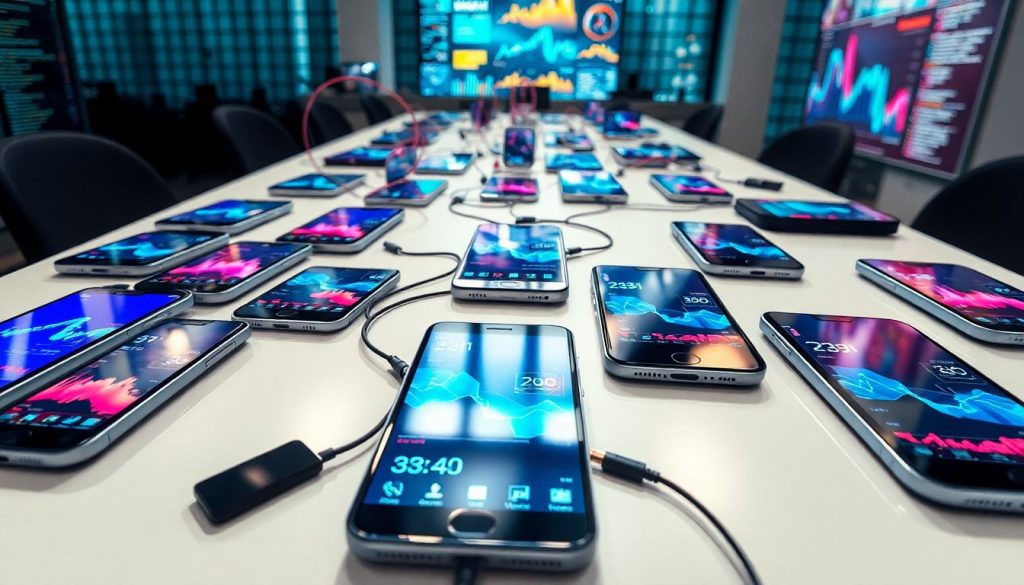Is it true that your smartphone is much more powerful than NASA computers used to land on the moon? Can you imagine that?
What, after all, exactly makes something a “computer”? Is it just those big, bulky desktops we used to have? A computer is any device capable of processing information TODAY. It has to execute software and do all sorts of things.
We do a lot more with our smartphones and tablets than just make calls and play games. They’re real computers. Their performance and intelligence can do almost anything that a classical computer can do. Old ideas are out the door and these are mini computers in our pockets.
Processing Power: Powerhouses in your pocket
Devices with mobile processors have existed for a while now. Early days, phones barely had the capability for simple stuff. Now, they are running complicated apps and games flawlessly. That is all thanks to some major improvements in processing power.
CPU and GPU Performance
The CPUs and GPUs in smartphones and tablets are hyper powerful. They can even outperform older desktop computers. Examples include Apple’s A-series chips and Qualcomm Snapdragon processors. These chips take care of demanding tasks effortlessly. If you edit videos or play graphic-intensive games, for example. These mobile processors frequently perform well in benchmark tests, too. These display their remarkable capabilities.
RAM and Storage Capacity
I suspect this line of thinking gained a little traction when smartphones and tablets started coming with significant amounts of RAM and storage. Some even have more than your old laptop! This enables them to manage multiple apps simultaneously. It allows you to store tons of photos, videos, and files. A good deal of space and memory helps in better performance.
Operating Systems: The Sophisticated Software Platform
Powerful operating systems drive smart devices like tablets and smartphones. Such systems manage basics all the way to advanced tasks. They are simply not just software.
iOS vs. Android: The Comparison in Details
Mobile OSs: The two major contenders are iOS and Android. Each has its advantages and disadvantages. Apple’s iOS is acknowledged for simplicity and security. Android, which is used by a wide range of brands, has more extensive customization options. Both are capable of running complex applications and multitasking well. The rivalry fuels innovation between the two.
App Ecosystems: A World of Software
Mobile app stores for phones and tablets are vast. There is an app for just about everything. There are apps for photo editing, music making, and business operating. Most of these apps are professional quality. They can supersede desktop software. One of the reasons these devices are so helpful is the variety of apps available.
Beyond Touchscreens: Input and Output
There are more ways to interact with smartphones and tablets than simply through a touchscreen. They can connect all sorts of things to them. That greatly expands their capabilities.
Touchscreens and More: The Stylus, Keyboard, and Mouse
Touchscreens are cool, but sometimes you need something more. You can also connect keyboards and mice to your tablets to make typing easier. A stylus will turn your tablet into a digital notepad. This means they are suitable for work.
Broadband: A Portal to Infinite Chunks of the World
There are multiple ways smartphones and tablets have access to the internet. Can connect to Wi-Fi, Bluetooth and cellular data. This allows you to access cloud services and online resources from anywhere. If you are connected, these devices can be very useful.
Functionality: The New Definition of Being Versatile
Smartphones and tablets can be used for many different purposes. They are whimsical, but they also work, both play and work. That makes them excellent all-rounders.
Productivity Tools: Portable Office
You’ll find document writeups, spreadsheet generators, and presentation makers. These apps allow you to work on the move. This turns your tablet or smartphone into a mobile office.
The Entertainment Hub: Video Games, Streaming, Music and More
Smartphones and tablets are more than just devices for entertainment. You can play games, stream movies and listen to music. Mobile gaming is becoming increasingly popular. There are plenty of good streaming services in recent memory.
What About Smartphones and Tablets?
Please Note: This site uses cookies to store information on your computer. They believe their smaller size holds them back. Let’s consider some of the more common ones.
Form Factor & Portability — The Pros & Cons
Smartphones and tablets weigh less than laptops and are smaller. As a result, they are lightweight and portable. However, they can be more difficult to work with, long-term. Desktops are more powerful, but are fixed in one location. But each form factor has its advantages and disadvantages.
Computing: The Common Core of All Devices
The boundaries between devices are softening. Smartphones, tablets and computers are blurring together. This process is said to be convergence. It may soon be difficult to know which is which.
Conclusion
So, do smartphones and tablets count as computers? Absolutely! They boast processing power, software, and functionality capable of doing nearly anything a traditional computer can do.
These compact devices have revolutionised our work, play and interactions. Use the power in your hand to uplift the shackled. It’s time to think of your smartphone or tablet as the compute power that it really is. Give it a try. You may be surprised at how much it can do.
